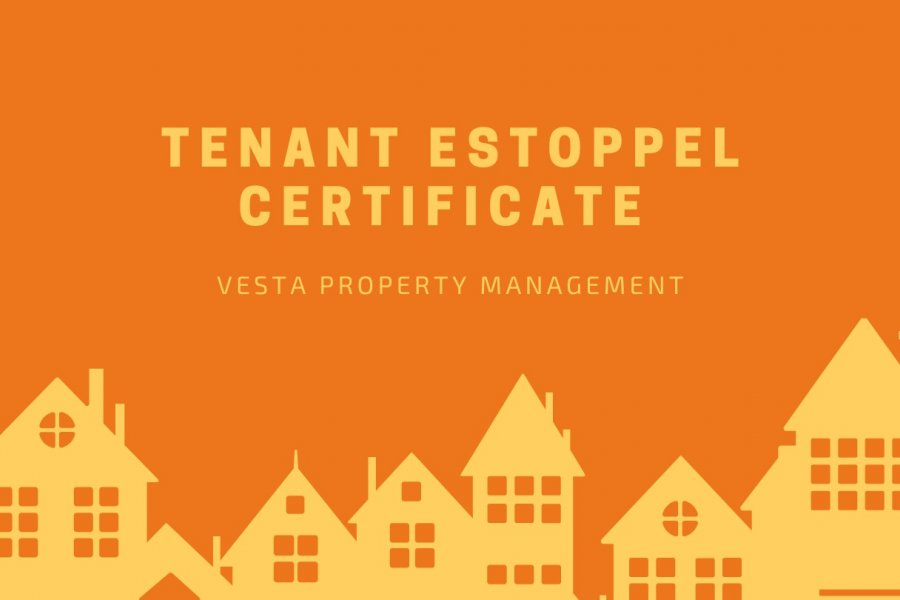
- Tenant Estoppel Certificates Safeguard Your Investment – They confirm lease terms, tenant obligations, and rental income, reassuring buyers, lenders, and investors.
- Requesting Certificates Early Prevents Delays – Collecting them ahead of refinancing, selling, or lease assignments avoids disputes and keeps transactions on track.
- Well-Drafted Certificates Strengthen Legal Protection – Accurate details and tenant acknowledgments reduce the risk of future claims, disputes, or hidden agreements.
As a rental property owner, you may find yourself navigating a sea of legal documents, financial statements, and tenant communications. Among the most important and sometimes overlooked tools in your arsenal is the tenant estoppel certificate.
In today’s blog by Vesta Property Management, we will help you understand the tenant estoppel certificate and why it matters. If you are preparing to refinance, sell your property, or enter into an agreement with an investor or lender, you must use and understand this document correctly.
Learn How We Can Help You Maximize Your Home’s Potential.
What Is a Tenant Estoppel Certificate?
A tenant estoppel certificate is a written statement completed by a tenant that confirms the terms of their lease, verifies whether the landlord has violated or waived any rights under that lease, and asserts that the tenant does not hold claims against the landlord. In essence, it “locks in” certain facts as truth, upon which a third party, such as a lender, buyer, or investor, can rely.
Imagine an investor is considering purchasing your rental property. The investor needs reassurance that tenants are abiding by lease terms, that there are no unrecorded arrangements or unresolved disputes, and that rental income is stable and confirmed.
The tenant estoppel certificate serves precisely this purpose by documenting the lease’s key provisions, such as rent amount, lease term, security deposit details, and whether any party is in default.

Cases When Property Owners Will Need Tenant Estoppel Certificates
Tenant estoppel certificates carry weight in several contexts. Including the following:
- Refinancing Your Property: Lenders want to ensure that tenants are paying rent and that the lease agreements are enforceable. Without verification, lenders may question your revenue stream or perceive risk, potentially leading to loan delays or less favorable terms when refinancing your property.
- Selling Your Property: You must provide prospective buyers with confidence. An estoppel certificate assures buyers that the property’s income is stable, that tenants are not engaged in disputes, and that the lease terms are reliable. This can accelerate the sales process, improve buyer confidence, and ultimately enhance the sale price.
- Lease Assignments: Estoppel certificates can also be required in a lease assignment, where you assign your lease to another investor or landlord. The assignee will want to verify lease terms and tenant status before taking over. The tenant’s own signature on the estoppel certificate prevents later contestation of those facts.
Without proper estoppels in place, you may face situations where the tenant argues that landlords waived rights, or claims are made regarding undocumented rent concessions or extensions. That ambiguity can derail negotiations or even result in legal liability.
Discover the Benefits of Hiring Vesta Property Management!
Key Information Included in a Well-Drafted Tenant Estoppel Certificate
A typical estoppel certificate should include confirmation of important lease data. This generally includes the following:
- Start and expiration dates of the lease.
- Renewal or extension options.
- Current rent amount and due date.
- Any prepaid rent or security deposits
- Tenant improvements.
- Concessions.
- Subletting or assignment permissions.
- Outstanding obligations.
- Notices of default.
- Whether the landlord or tenant has breached any terms of the lease agreement.
In the Virginia market, local regulations, short-term legislative changes, or municipal requirements may affect lease terms. It is important that the document includes local jurisdiction compliance.

For example, disclosures about lead paint, occupancy limits, or specific security deposit rules under Virginia law should be referenced when relevant. The certificate must accurately reflect any local-specific lease clauses or statutory obligations governing your property.
Another essential element is asking the tenant to acknowledge that they are unaware of any defaults by the landlord or landlord’s assignees, unrecorded agreements, or rent offsets. This provides a legal shield to buyers or lenders by indicating that claims cannot later be made about unknown arrangements.
Learn How We Help Real Estate Investors Succeed!
When to Request a Tenant Estoppel Certificate
It is wise to request estoppel certificates well before you need them. If refinancing, start the process early, possibly 90 days before closing. That allows time for tenant responses, revisions, or corrections. When selling, request estoppels as part of your due diligence package or buyer’s conditions.
Inform your tenants clearly about what the estoppel certificate is, why it is needed, and how to complete it. Emphasize that it protects their own interests by confirming the lease terms and preventing any misunderstanding.
Tenants may initially view the request with suspicion or confusion. Clear communication with tenants helps ensure prompt and accurate responses.
Streamlining the Estoppel Process With Professional Help
Working with a professional property management company streamlines the tenant estoppel certificate process while adding security and efficiency. Property managers use proven systems, standardized forms, and clear communication to reduce confusion and delays.

They ensure certificates are drafted accurately and tailored to local legal requirements, including necessary disclosures. Managers also track deadlines, follow up with tenants, clarify questions, and verify completeness. This saves you time during refinancing or sale.
With established relationships among lenders, investors, and attorneys, management companies know what third parties expect and can anticipate potential concerns.
Their involvement also reassures tenants, since requests from a trusted local team encourage timely and cooperative responses.
Contact Our Team Toady!
Bottom Line
A tenant estoppel certificate serves as a snapshot of your lease arrangements, a legal affirmation from tenants, and reassurance for those evaluating your income-generating property. Crafting one with precision and sensitivity to tenant concerns is essential.
Managing this process unaided can be stressful and risky. Engaging a professional property management company, especially one deeply rooted in your region, brings legal know-how, tenant goodwill, and operational efficiency to the process.
For rental property owners in Virginia, partner with Vesta Property Management to preserve your peace of mind while safeguarding your property’s performance, transaction readiness, and reputation.